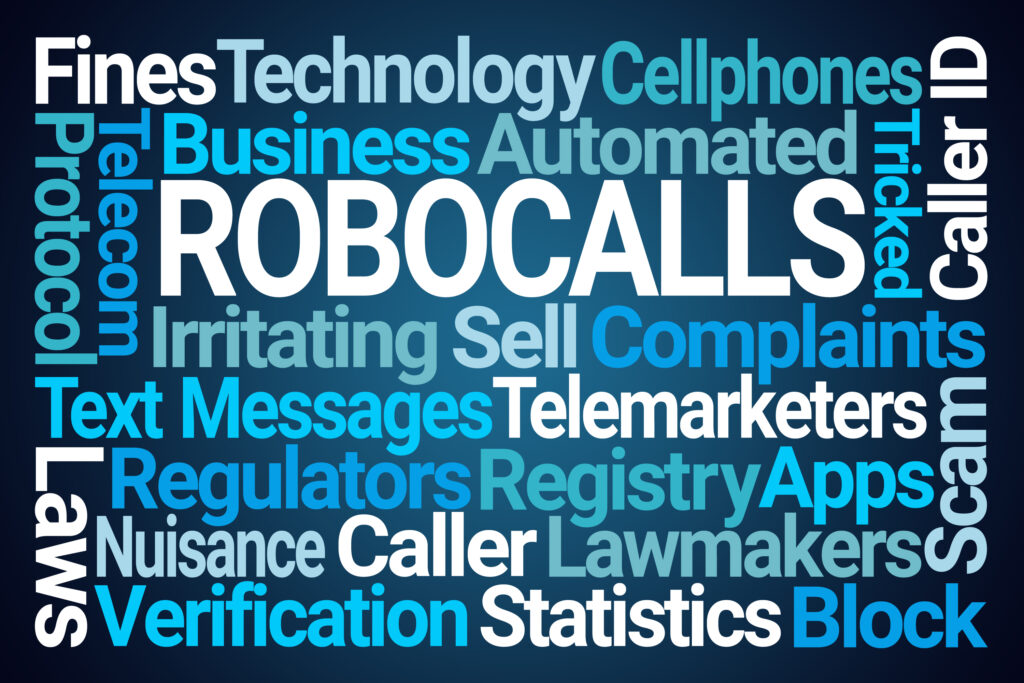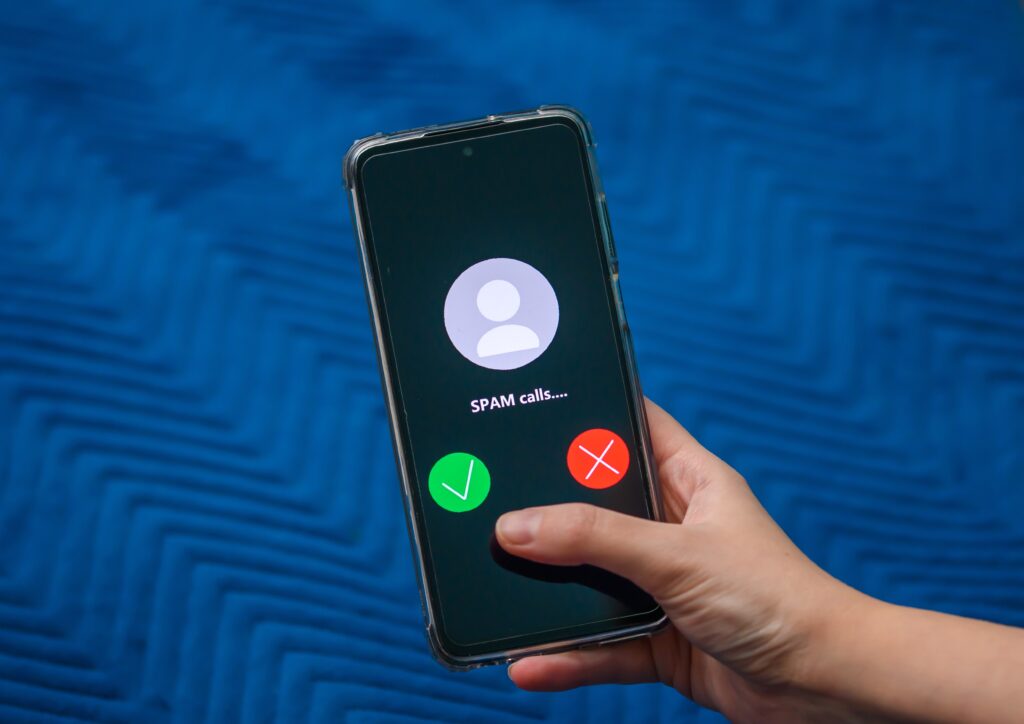Imagine this all-too-familiar scenario: You're sitting down to dinner with your family when suddenly the phone rings. The caller ID looks vaguely familiar, so you answer.
But instead of a real person, you're greeted by a robotic voice trying to sell you an extended car warranty or claiming to be from the IRS. Frustrated, you hang up, only for the phone to ring again with yet another automated message.
This is the plague of robocalls, and Americans received over 50 billion of them in just one year alone. A robocall is any phone call that delivers a pre-recorded message using an auto-dialer, usually without the recipient's consent.
These unwanted auto-dialed calls are not just a nuisance but can also lead to significant financial harm if the recipient is tricked into giving away sensitive information to scammers.
Both technology and the law are evolving to help protect consumers from the scourge of robocalls. Robocall blocking technology uses advanced algorithms to identify and filter out unwanted automated calls before they reach the recipient's phone.
Meanwhile, federal regulations like the Telephone Consumer Protection Act (TCPA) prohibit most robocalls made without prior consent and allow consumers to take legal action against robocallers who violate the law. If you received unauthorized robocalls and suffered financial harm, you have recourse under the law. Our experienced California TCPA attorney can help you fight back against TCPA violations and recover compensation.
What is the Future of Robocall Blocking Technology?
The future of robocall blocking technology is bright, with ongoing innovations on multiple fronts to better shield consumers from the billions of illegal robocalls placed each year.
Some key developments we can expect in the coming years:
- AI and Machine Learning - More sophisticated AI can analyze call patterns, audio fingerprints, and other data points in real time to quickly identify and block suspected robocalls with greater accuracy. Machine learning will allow robocall-blocking algorithms to continuously improve over time.
- STIR/SHAKEN - This is a framework that allows phone carriers to authenticate caller IDs. STIR stands for Secure Telephone Identity Revisited. STIR uses digital certificates based on common public key cryptography techniques to verify that a calling number is authentic and hasn't been tampered with. SHAKEN stands for Signature-based Handling of Asserted information using toKENs. SHAKEN specifies how telecommunications providers should implement STIR in their networks, including how to handle, sign, and verify calling number information.
- Advanced Call Filtering - More granular filters will give consumers greater control, allowing them to block specific numbers, area codes, prefixes, and categories of callers (like suspected scams). Expect to see these features integrated directly into smartphones and available via carrier apps, if you haven’t already.
- Caller Verification - New technology and databases will make it easier to verify when a caller is who they claim to be, such as confirming that a call is coming from your bank or doctor's office. The TRACED Act also requires the FCC to establish a process to streamline caller ID verification.
- Legislative Action - Congress and the FCC will likely continue enacting new laws and rules to crack down on illegal robocalls. For example, proposed bills would increase fines against robocallers and require phone companies to provide free robocall-blocking services.
- Improved Information Sharing - Government agencies, carriers, robocall blocking services, and consumer groups will increasingly share data about robocall campaigns and scammer tactics, leading to swifter identification and shutdowns.
As robocall-blocking technology advances, scammers are also developing more sophisticated tactics to evade detection. Some robocallers now use neighbor spoofing to display numbers similar to the victim's area code.
They also employ brief "wangiri" calls, also known as a one-ring scam or one-ring fraud, a type of phone scam where the scammer calls a victim's phone number and hangs up after one or two rings, hoping the victim will call back out of curiosity or concern.

If the victim does call back, they may be connected to an international hotline or pay-per-minute service that charges exorbitant fees, with the scammer pocketing a portion of the revenue.
In addition to robocall blocking technology, strict enforcement of consumer protection laws like the TCPA will safeguard the public from illegal robocalls and hold bad actors accountable.
What is the TPCA and How Is it Intended to Protect Consumers?
The TCPA is a federal law passed by Congress in 1991 to safeguard consumers' privacy rights in the face of abusive telemarketing practices and technologies. The TCPA restricts various types of unsolicited calls, texts, and faxes, including robocalls, with the goal of protecting consumers from unwanted and intrusive communications.
Key provisions of the TCPA include:
- Consent Requirements - The TCPA prohibits most robocalls, robotexts, and unsolicited fax advertisements unless the sender has the recipient's prior express consent. For telemarketing robocalls, the consent must be in writing. Consumers have the right to revoke their consent at any time.
- DNC List - The TCPA requires the FCC to maintain a national Do-Not-Call Registry where consumers can opt-out of receiving telemarketing calls. Telemarketers must check this list every 31 days and avoid calling registered numbers.
- Identification - Telemarketers must provide their name, the name of the business they're calling on behalf of, and a contact phone number or address.
- Time Restrictions - The TCPA limits telemarketing calls to between 8:00 a.m. and 9:00 p.m. local time for the recipient.
- Opt-Out Mechanisms - Prerecorded telemarketing messages must provide an automated opt-out mechanism so recipients can avoid future calls.
- Damages - Consumers can sue TCPA violators for statutory damages of $500 to $1,500 per unlawful call or message.
These requirements are intended to give consumers more control over the calls and messages they receive, limit disruptive and misleading communications, and provide meaningful remedies against those who violate the law.

The TCPA is a powerful shield, but it's not foolproof. Some telemarketers and scammers still flout the law, hiding behind spoofed numbers or operating overseas. Certain types of automated calls, such as political calls and calls from nonprofits, are exempt from some TCPA provisions.
Aggressive TCPA enforcement by regulators, phone carriers, and consumer advocates, along with evolving robocall blocking technology, will be key to making the TCPA's promise of consumer privacy a reality in the digital age.
As long as illegal robocallers keep finding new ways to exploit our phones, ongoing efforts to fortify and update the TCPA's protections will be essential.
How Can an Experienced TCPA Lawyer Help Consumers?
An experienced TCPA lawyer can be a powerful ally for consumers harmed by illegal robocalls, robotexts, or junk faxes. These attorneys specialize in consumer protection law and have deep knowledge of the TCPA's complex provisions, as well as the latest court rulings and FCC regulations that shape how the law is applied.
TCPA lawyers can review the details of the unwanted calls or messages you've received and assess whether they likely violated the law. They know what types of communications are prohibited, what evidence is needed to prove a violation, and how to build a strong case.
The TCPA allows consumers to sue for statutory damages of $500 to $1,500 per illegal robocall or message. In some cases, you may also recover actual damages, such as if a scam robocall led to financial losses.
A TCPA attorney can help you determine what types of damages to seek and advocate for your rights in court.
If a robocaller has bombarded numerous consumers with similar illegal calls, a TCPA lawyer may recommend pursuing a class action lawsuit. This allows multiple victims to band together, share evidence and costs, and pursue a larger judgment. Successful TCPA class actions can result in significant settlements and send a strong message to robocallers.
Filing a TCPA Claim
Bringing a TCPA claim involves many legal steps and procedures, from gathering evidence to filing court papers to negotiating with defense counsel. An experienced TCPA lawyer can guide you through each stage of the process, advise you of your options, and relieve the burden of directly taking on a big corporation or aggressive telemarketer.
Many TCPA attorneys are passionate consumer advocates who have seen firsthand the stress and harm that abusive robocall practices can inflict. They can lend a sympathetic ear, provide counsel on coping with robocall harassment, and connect you with other resources and support services for victims.
By helping consumers bring TCPA claims, robocall lawyers play a key role in enforcing the law and deterring future violations. Successful TCPA suits can lead to significant judgments and negative publicity for illegal robocallers, making them think twice before engaging in prohibited practices again.
Of course, not every robocall warrants legal action, and not every TCPA case is clear-cut.
An experienced attorney can help you weigh whether you have a viable claim and what the process of pursuing it would entail. Many TCPA lawyers offer free consultations and work on a contingency basis, meaning you only pay a fee if they win your case.
Contact an Experienced TCPA Lawyer at Kazerouni Law Group
While robocall-blocking technology and consumer protection laws like the TCPA can help stem the tide of illegal robocalls, many scammers still flout the law and invade consumers' privacy. If you received unauthorized robocalls, been tricked into giving away personal information, or suffered financial harm as a result, you have recourse under the law.
Kazerouni Law Group is a nationwide consumer protection law firm dedicated to holding illegal robocallers accountable. Our experienced attorneys have helped countless clients fight back against TCPA violations and recover compensation for their financial and privacy harm.
Contact Kazerouni Law Group today for a free, no-obligation consultation with a knowledgeable robocall attorney. You pay nothing unless we win your case. Call our firm today at 800-400-6808 or contact us online anytime to learn more about how we can help protect your rights as a consumer in the age of robocalls.